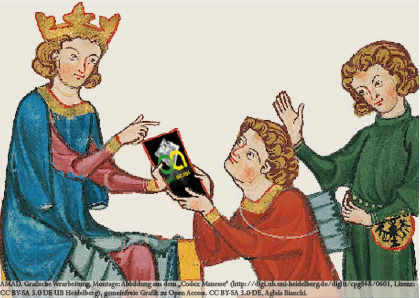AMAD
„Archivum Medii Aevi Digitale - Interdisziplinäres Open-Access-Fachrepositorium und Wissenschaftsblog für Mittelalterforschung‟Zur Einreichung

| Datum: | 2007 |
| Titel: | Le Donne di Dante: An Historical Study of Female Characters in The Divine Comedy |
| Autor*in: | Carey, Brooke L. |
| Beschreibung: | This thesis explores the characterizations of women in Dante’s Divine Comedy and uses this information to assess Dante’s opinion of women, including their behaviors, traits, and roles in society. It approaches The Comedy from a specific historical angle and requires a basic knowledge of the poem in order to understand some of the references. The entire text incorporates historical sources and evidence to support these interpretations of women in The Comedy, as they demonstrate why and how Dante might have characterized women in the way he did. Many of the arguments are supported by the Summa Theologica of Thomas Aquinas and several texts by Aristotle, as both of these writers influenced Dante’s writing. The first chapter examines the women of the Inferno, especially those punished for lust, and determines that Dante considered women to be less reasonable and more susceptible to temptation than men. This chapter also highlights Dante’s use of the defiled female body to portray the perversion that results from sin as well as the dangers of female sexuality. The second chapter looks at the women of Purgatorio and deduces that Dante placed immense power in feminine prayer. Most of the evidence for this argument comes from the fact that several male souls in Purgatory emphasize the importance of the prayers from their female relatives in shortening their stay in Purgatory. The third chapter studies the women of Paradiso and shows that Dante believed that women possessed free will that allowed them to resist temptation and make rational decisions. This chapter also shows that Dante had a high regard for mothers, as is evident by his worship of the Virgin Mary. It also shows that Dante advocated separate social spheres for men and women and endowed each sex with a different set of appropriate virtues. The final chapter focuses on Beatrice and shows that, although Dante believed women inherently lacked the courage, strength, and intelligence of men, they possessed the capacity for revelation, which they could use not only to help themselves understand divine truth but also reveal these truths to others. Overall, the paper concludes that, although Dante agreed with many of his contemporaries that women were physically and mentally weaker than men and that they should not take up the same social functions as men, he believed that, in the afterlife, men and women could achieve equality and that, due to their immense spiritual power, women could potentially become perfect. |
| URI: | https://www.amad.org/jspui/handle/123456789/109162 |
| Quelle: | https://surface.syr.edu/cgi/viewcontent.cgi?article=1580&context=honors_capstone https://surface.syr.edu/honors_capstone/573 |
| AMAD ID: | 608879 |
| Enthalten in den Sammlungen: | BASE (Bielefeld Academic Search Engine) General history of Europe |

